Novosibirsk State University of Economics and Management
Novosibirsk State University of Economics and Management, NSUEM (full name Federal State-Funded Educational Institution of Higher Education «Novosibirsk State University of Economics and Management») – social and economic higher education institute in Novosibirsk, Russia.
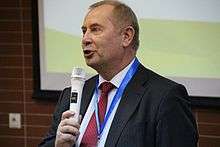
History
In 1929 Siberian Institute of National Economy was launched in Novosibirsk, and was based in the contemporary building of Novosibirsk State architectural and art Academy. The main aim was to provide the economic managers for the national economics. Teaching staff in 1929 consisted of 10 people and in 1931 it gained up to 57, within them: 4 professors, 19 associate professors.
In the first academic year Institute launched 4 faculties: planned economy, industrial, product exchange and distribution, economic and agricultural management.
In 1967 according to Administrative order by the Minister of high and secondary education ) Novosibirsk Institute of National Economy (NINE) was launched on the basis of All Union correspondence financial-and-economic Institute branch. NINE was launched on the 1 of August 1968. The first rector was Victor Pervushin.
In 1986 Peter Shemetov became rector. He was aimed on pre-entry preparation and bringing up a multi-level educational system in Institute. He launched Doctorate degree education and printing and publications center.
An important place was given to the pre-higher education faculty, which was later transformed into Economic lyceum – the first behind the Urals. In those years there was shortage of qualified specialists in the fields of economics (financiers, accountants and etc.). And the Institute met this demand.
In 1994 the Institute received the status of the Academy, and in 2004, the status of the University. The University status led NSUEM to a new name: Novosibirsk State University of Economics and Management.
Most structures of modern NSUEM were created in post-soviet time.
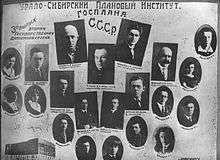
There are:
- Faculty of Information and Technologies (reformed),
- Faculty of Law,
- Faculty of Social and Humanitarian Science (reformed),
- Center of training and certification for auditors under the Ministry of Finance of Russian Federation,
- Training center for crisis managers,
- Center of information technologies, which is responsible for implementing information technologies at the whole university,
- Case-club of NSUEM, where student can develop their skills to find the best options and decisions in complicated working situations,
- International business school, where some international educational programs are realized,
- International center of computer education "APTECH NSUEM" (the official center of corporation APTECH WORLDWIDE),
- Children computer school of animation, where teenagers and children can learn how to use modern technologies,
- Center of graduates support and etc.
In 1991 Thesis board was organized. In 1992 Institute has become an experimental place to launch double level education system: Bachelor's Degree and master's degree.
In January, 2001 for the first time issued its magazine “Our Academy”
In September 2012 the 5th academic block was delivered, and before that NSUEM launched the 4th academic block.
Since 7 June 2014 NSUEM is headed by Alexandr Novikov.
University was reorganized:
- Institutes were formed into faculties;
- New management system was formed (Departments of youth policy, external affairs, informational technologies and scientific policy)
NSUEM rectors
- Viktor Aleksanrovich Pervushin (19 May 1967 – 17 May 1974)
- Viktor Nikolaevich Schukin (17 May 1974 – 19 July 1983)
- Anatolii Danilovich Korobkin (14 July 1983 – 15 September 1986)
- Petr Vasiljevich Shemetov (27 November 1986 – 16 February 1998)
- Yurii Vasiljevich Gusev (28 April 1998 – 29 April 2013)
- Olga Vitaljevna Molchanova (29 April 2013 – 22 May 2014)
- Alexandr Vladimirovich Novikov (7 July 2014 – to the present day)
NSUEM today
Novosibirsk State University of Economics and Management (NSUEM) is the biggest educational complex in the field of economics in Western Siberia.
Over 13 thousand students study in NSUEM. The number of faculty members is over 450 persons, among them 67 are Doctors of Science and 258 are PhD of Science.
NSUEM has tier system of continuous education: undergraduate, graduate, and doctoral programs. The Thesis Board works at NSUEM. Business College of NSUEM is the institution of secondary vocational education, which has 9 specializations.
There are 4 faculties at NSUEM:
- Faculty of Corporate Economics and Entrepreneurship
- Faculty of Government
- Faculty of Law
- Faculty of Basic Education
Another level of NSUEM education system is postgraduate education:
- Additional training and professional education courses;
- Educational centers and schools
NSUEM actively implements state-of-the-art educational technologies: professional simulations, workshops, project method, and on-line education. As a result of practice-oriented education almost 90% NSUEM graduate students find job immediately after graduation. NSUEM is a regional center of postgraduate education: MBA program provides training for the top-managers, APTECH program trains IT-specialists. Also there are retraining programs and advanced training programs. Cooperation with international Universities and organizations is an integral part of NSUEM life, which leads to active student exchange programs.
University structure
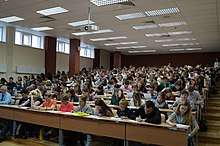
Faculty of Corporate Economics and Entrepreneurship
Faculty of Corporate Economics and Entrepreneurship is a structural subdivision of NSUEM
In 2014 a new step of development has begun in NSUEM, within the University reconstruction Institutes of Economics and Management were united into Faculty of economics.
At the moment Faculty of Economics is the biggest in NSUEM by the quantity of students.
Acting dean – Doctor of Economics, Professor Sergei Filatov.
- Department of Service Business
- Department of information and analytical support and accounting
- Department of Corporate Governance and Finance
- Department of Marketing, Advertising and Public Relations
- Department of Financial Market and Financial Institutions
- Department of Labor Economics and Human Resources
- Department of Innovation and Entrepreneurship
Faculty of Basic Education
Faculty of Basic Education is a structural subdivision of NSUEM.
Acting Dean – Lada Shekhovtsova
- Department of Foreign Languages
- Department of Physical Education and Sport
- Department of Philosophy and Humanities
- Department of Economic Theory
- Department of Mathematics and Natural Sciences
- Center of Secondary Vocational Education
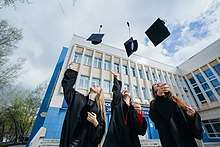
Faculty of Government
Faculty of Government
Acting Dean – Doctor of Technical Science, Professor Andrey Makartsev.
- Department of Statistics
- Department of Sociology
- Department of World Economy, International Relations and Law
- Department of Public Finance
- Department of Psychology, Pedagogy and Law
- Department of Regional Economics and Management
- Department of Environmental Safety and Environmental Management
- Department of Applied Informatics
- Department of Information Technology
Faculty of Law
the demand of the education programs development, NSUEM launches Faculty of Law. “Legal clinic” is a part of the Faculty. Faculty is oriented for lawyers training for organizations of different economy spheres. The graduates work in different government structures; hold the position in the departments of the Ministry of Internal Affairs of the Russian Federation.
Acting Dean – PhD in Law, associate professor Dmitri Savchenko.
- Department of Administrative, Financial and Corporate Law
- Department of Civil and Business Law
- Department of Theory and History of State and Law
- Department of Criminal Law and National Security.
Academic activities
NSUEM academic day starts at 08.00 a.m and lasts till 20.00. In the group schedule there are 4 classes the most. Students attend lectures and seminars. Academic activities are held in auditoriums, computer classes, and specially equipped laboratories.
University students actively take part in regional. All-Russian, national, international seminars, Olympic, forums and other events.
Extra-curricular activities
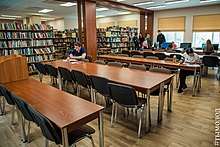
NSUEM offers 7 areas of extra-curricular activities:
- Leadership and initiatives;
- International relations;
- Analytics, science and innovation;
- Culture and creation work;
- Healthy lifestyle and safety & security;
- Business and Entrepreneurship;
- Politics and governance.
Each area combines representatives from NSUEM and business and governmental society representatives.
Student’s life in NSUEM
Since 1996 NSUEM launched a Student's club. The club owns modern lightning and sound equipment. Permanently students Club has:
- Vocal class;
- School of modern dance “High voltage”;
- Art-ballet “Shpilhouse”;
- Literature club;
- Theatre studio;
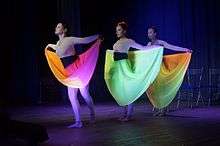 Art-ballet
Art-ballet - Design and ornamental studio “Masteritca”;
- Esthetic development studio “fashion studio Ocean”;
- Guitar music club
International relations in NSUEM
NSUEM is an active participant of academic and scientific exchange programs. University has over 150 international Agreements. Since 1991 NSUEM works with international organizations and launches international projects. NSUEM cooperates with: CIS countries, Federal Republic of Germany, Republic of China, Mongolia, Republic of Korea, United States, France, Czech Republic, Republic of India, etc.
Main directions of International activities are:
- Students exchange programs;
- Interuniversity cooperation;
- Scientific and research projects
Educational programs in the frames of academic exchange:
- Student's exchange programs;
- Language schools;
- Summer schools;
- Double Degree programs;
- MBA co-programs;
- Teachers exchange programs;
- Scientific and research programs;
- New approaches in teaching technologies.
NSUEM partners:
- Xinjang University, China
- Dalian University of foreign languages, China
- Mudanjiang Normal University, China
- SolBridge, International Business school
- State University of New York, USA
- Coburg University of Applied Sciences, Germany
- Management College, Mancosa, Republic of South Africa
- Arena Multimedia], Republic of India
- Animation Surat
Over 200 students and teaching staff took part in exchange programs and international events. NSUEM welcomed official delegation of: South Africa, Republic of India, Japan, Federal Republic of Germany, etc.
NSUEM publications
“NSUEM reporter”, a scientific magazine
NSUEM reporter is issued 4 times a year.
Chief editor – Vladimir Glinskiy, Doctor of economics, professor, Head of Statistic Department, NSUEM
Scientific Magazine “Ideas and ideals”
Issued once a quarter (in 2 parts)
Humanitarian almanac «Human.RU»/
Almanac publishes: modern research results in the spheres of: philosophy, psychology, pedagogic, traditional and modern anthropology practices.
Newspaper «Our Academy»
It is issued once in 2 weeks, having 16 columns. It covers: University life, interviews, scientific research results, etc. The circulation is 500 distributed in University. “Our Academy” has its e-publication within the official web-site of NSUEM. .
Entering NSUEM
Entering NSUEM for Bachelor's degree is based on the results of Unified State Exam